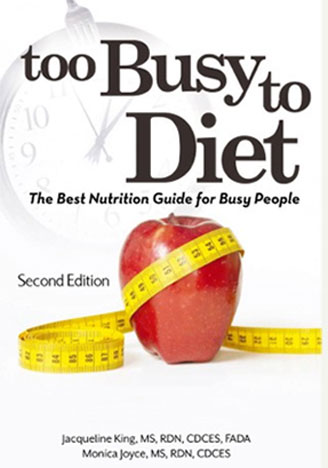Why all the Fuss about Organic?
in The Too Busy to Diet Blog on January 19, 2015
 As a registered dietitian/nutritionist I find the hoopla about organics to be a concern. We should be aware of potential chemicals/pesticides in our food. But when Americans are getting 7% of their calories from soft drinks that are more than they are getting from vegetables, I wonder if organic concerns could be misplaced.
As a registered dietitian/nutritionist I find the hoopla about organics to be a concern. We should be aware of potential chemicals/pesticides in our food. But when Americans are getting 7% of their calories from soft drinks that are more than they are getting from vegetables, I wonder if organic concerns could be misplaced.
Americans consume more calories from sweets than any other food group. With the diabetes and obesity epidemic, I find the obsession about organics to be an important issue, but I feel that access to food, and particularly nutritious and healthy food to be more crucial.
When I go to the grocery store I see the severely obese searching the produce aisles for organics when their major issue should be what to do about their weight. It makes no sense that the public is worrying so much about pesticides when our major concern should be calories and quality nutrition to improve health and reduce disease states.
So, I have put together the following list to consider when buying organic or non-organic foods to summarize the issues that you should be concerned about.
1) Studies done at University of Michigan have shown that eating organic foods does not improve health or prevent disease. There is also no significant difference in organic nutritional benefit or calories. Eating organic foods will not help the overweight and obese to lose weight.
2) It is important to remember that it is almost impossible to get organic foods everywhere you eat. Americans are presently consuming 4-5 meals away from the home weekly and spending $232/month on these foods. So, it makes sense not to get overwhelmed when you cannot get organic food or reduce the amount of fruit and vegetables when you are away organic, make up for missed portions when you return home, and avoid the Dirty Dozen.
3) The use of organics for children is a concern because their size, growth, and development make it important to eat a healthy, nutritious diet devoid of chemicals and pesticides. The American Academy of Pediatrics (APA) has stated that the amount of pesticides in conventional foods was found to be within safety limits. They have also expressed their concern that the high cost of organics might reduce the overall consumption of items that are crucial for growing and developing infants and children. They state that it is important that infants and children obtain enough of the produce that they need and to follow suggestions below and also watch the EWG list of foods to watch specifically for problems.
4) When using any produce make sure that you are washing and scrubbing the items to remove dirt, bacteria, and surface pesticide residues. With items like cantaloupe, try to peel the outside covering since slicing through with a knife will spread the contaminants to the inside of the fruit. Do not use soap. Outer leaves of leafy vegetables should be removed and the remainder should be washed carefully. It is wise
to trim visible fat and skin from meat because pesticide residue collects in fat.
5) Try growing your own produce in your own garden or purchase organic produce at local Farmer’s markets or produce co-ops to reduce the pesticides in your foods. The foods are generally sold closer to the point of harvest so they tend to also have more flavor.
6) The Environmental Working Group (EWG) is an organization that provides information about the pesticide content of foods that acts as a watchdog group to inform the public about the safety of their food. It analyzed the 48 popular produce items that had the highest pesticide residue and recommend buying organic varieties if possible. Tomorrow the (EWG) Dirty Dozen List will be posted, followed by the safe list of conventional produce the next day.
Remember to follow TooBusytoDiet.com for new information on good nutrition and ways to eat healthy with a busy lifestyle.
Buy the Too Busy to Diet book
Get your copy of the definitive diet reference guide and healthy eating book today. Stop reading those misleading fad diet books and read an easy to follow book on how to lose weight and keep it off from actual Registered Dietitians.

Recent Posts
- Barbeque Turkey Meatloaf
- Pescado a la Veracruzana
- Juicy Pork Chops
- Rotasserie Chicken Casserole
- Grilled Salmon & Blueberry Salad